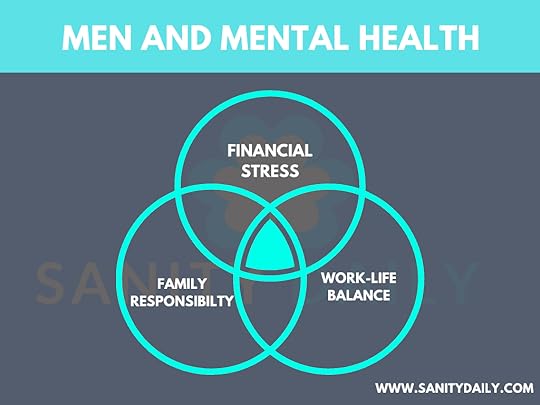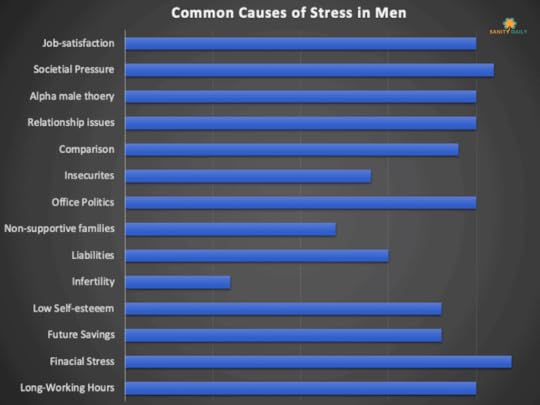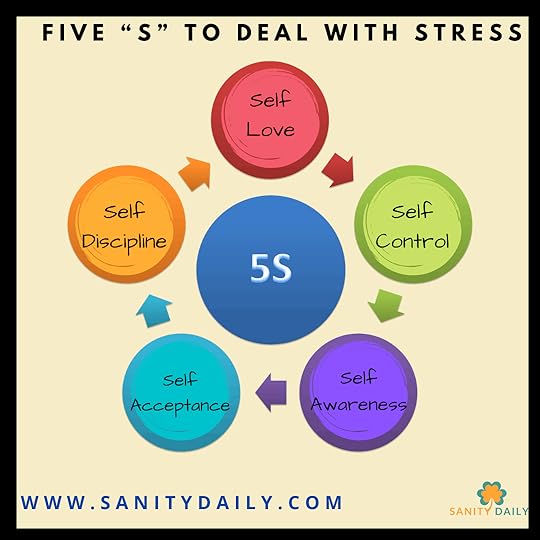Priyanka Nair (Joshi)'s Blog, page 4
December 10, 2024
What is Lorem Ipsum?
December 9, 2024
40 Little Things That Makes a Woman Happy
 What makes a woman happy?Maybe a little attention, appreciation, and some love!! We are a species that is continuously seeking attention from our loved ones. Reason? It gives us motivation, encouragement, and maybe a mood lift. When we cook something special, we seek feedback, when we dress up we look up for a compliment, when we feel low we long for those warm hugs, and all this makes us feel loved and wanted, that’s it.The life of a married woman revolves around her family, she works tirelessly and selflessly for her family and all she needs is some consideration and admiration in return. We can adopt several measures to show her that we care about her and below I am going to mention a few. So, all the husbands and boyfriends or anyone who wants to make their woman happy, do not miss reading this blog till the end. Something might click for you
What makes a woman happy?Maybe a little attention, appreciation, and some love!! We are a species that is continuously seeking attention from our loved ones. Reason? It gives us motivation, encouragement, and maybe a mood lift. When we cook something special, we seek feedback, when we dress up we look up for a compliment, when we feel low we long for those warm hugs, and all this makes us feel loved and wanted, that’s it.The life of a married woman revolves around her family, she works tirelessly and selflessly for her family and all she needs is some consideration and admiration in return. We can adopt several measures to show her that we care about her and below I am going to mention a few. So, all the husbands and boyfriends or anyone who wants to make their woman happy, do not miss reading this blog till the end. Something might click for you  40 Little Things That Makes a Woman Happy
40 Little Things That Makes a Woman Happy The below-mentioned points are based on a very simple philosophy of cherishing little things and paying attention at the right time. Hence, I will begin with the most basic requirement to make a woman happy, i.e. LOVE1.) Love abundantly2.) Respect willingly3.) Appreciate whole-heartedly4.) Express it all5.) Encourage her to move ahead6.) A warm hug a day keeps the doctor away7.) A kiss on the forehead8.) An active listening9.) Support her to follow her dreams10.) Motivate her11.) Surprise her12.) Compliment her13.) Be grateful14.) Cherish memories and make new ones15.) Share load load16.) Compassion17.) Empathize18.) Be her stress-relief19.) Pamper her20.) Cooking with her21.) Hold her hands22.) Keeping a check on her23.) Help her to overcome her inner demons24.) Make her feel secure25.) Don’t doubt her decision-making26.) Stand for her and by her27.) Don’t compare her with other women28.) Keep that intimacy alive29.) Learn to say sorry30.) Learn to forgive31.) Try dancing together32.) Read together33.) Go for walks34.) Be open to change35.) Don’t ignore her36.) Help her find her way37.) Let her know how you feel38.) Let her know you care39.) Don’t let her give up on you40.) Fall in love daily1.) Love abundantlyIt is said that love can even thaw mountains, but only if it is true. Most of the men feel that why should we say I love you daily or why should we tell at all, isn’t that understandable? To understand it more, a woman wants to listen to it more often, if a few words of love can bring a smile to her face, what’s the harm?2.) Respect willinglyWith love comes respect and when you respect your woman and give her a special place in your heart, she will always rejoice in it, value it. A woman feels positive when she is loved and respected equally.3.) Appreciate whole-heartedlyA little bit of appreciation goes a long way, just one day you help her doing the dishes she says thank you t you because she feels obliged, do you say thank you to her for what all she does for you and your family? You don’t have to literally say it all the time, but being grateful helps.4.) Express it allExpress what you feel, we take feelings for granted and it creates a gap between our understanding many times. When you stop expressing how you feel, she somehow stops believing you and
even goes into self-doubt
. Sit, talk, and let her know.5.) Encourage her to move aheadWe get discouraged very easily, lose all the confidence and feel devastated on many occasions because we expected to be perfect all the time, let her know that
it is ok to imperfect, and encourage her to stay happy
with all the little imperfections around her.6.) A warm hug a day keeps the doctor awayJust when you see her tired and she calls a day off, switching off the lights, making her children sleep. just give her a warm hug to make her feel loved, say nothing, just be there in the moment, she will feel 50% lighter.7.) A kiss on the foreheadStart your day with it or before you go to the office, she will carry that love in the heart the entire day and the smile this little gesture will bring to her is priceless and enough for the day.8.) An active listeningYou will see her irritated on many occasions, sometimes due to hormonal issues, menstruation, and sometimes without any reason, just try to be there for her. Listen to her as a friend, it will help her ease.9.) Support her to follow her dreamsMany women crave a strong support system from their life-partners, it boosts their confidence and morale to move ahead in life. Support her with her dreams and help her achieve them.10.) Motivate herWe all need motivation in life and with a little motivation you can make her an incredibly motivated woman, she will be energetic and feel good about herself the entire day. Women attach a lot of sentiments to their family and when they boost their morale, she blooms.
The below-mentioned points are based on a very simple philosophy of cherishing little things and paying attention at the right time. Hence, I will begin with the most basic requirement to make a woman happy, i.e. LOVE1.) Love abundantly2.) Respect willingly3.) Appreciate whole-heartedly4.) Express it all5.) Encourage her to move ahead6.) A warm hug a day keeps the doctor away7.) A kiss on the forehead8.) An active listening9.) Support her to follow her dreams10.) Motivate her11.) Surprise her12.) Compliment her13.) Be grateful14.) Cherish memories and make new ones15.) Share load load16.) Compassion17.) Empathize18.) Be her stress-relief19.) Pamper her20.) Cooking with her21.) Hold her hands22.) Keeping a check on her23.) Help her to overcome her inner demons24.) Make her feel secure25.) Don’t doubt her decision-making26.) Stand for her and by her27.) Don’t compare her with other women28.) Keep that intimacy alive29.) Learn to say sorry30.) Learn to forgive31.) Try dancing together32.) Read together33.) Go for walks34.) Be open to change35.) Don’t ignore her36.) Help her find her way37.) Let her know how you feel38.) Let her know you care39.) Don’t let her give up on you40.) Fall in love daily1.) Love abundantlyIt is said that love can even thaw mountains, but only if it is true. Most of the men feel that why should we say I love you daily or why should we tell at all, isn’t that understandable? To understand it more, a woman wants to listen to it more often, if a few words of love can bring a smile to her face, what’s the harm?2.) Respect willinglyWith love comes respect and when you respect your woman and give her a special place in your heart, she will always rejoice in it, value it. A woman feels positive when she is loved and respected equally.3.) Appreciate whole-heartedlyA little bit of appreciation goes a long way, just one day you help her doing the dishes she says thank you t you because she feels obliged, do you say thank you to her for what all she does for you and your family? You don’t have to literally say it all the time, but being grateful helps.4.) Express it allExpress what you feel, we take feelings for granted and it creates a gap between our understanding many times. When you stop expressing how you feel, she somehow stops believing you and
even goes into self-doubt
. Sit, talk, and let her know.5.) Encourage her to move aheadWe get discouraged very easily, lose all the confidence and feel devastated on many occasions because we expected to be perfect all the time, let her know that
it is ok to imperfect, and encourage her to stay happy
with all the little imperfections around her.6.) A warm hug a day keeps the doctor awayJust when you see her tired and she calls a day off, switching off the lights, making her children sleep. just give her a warm hug to make her feel loved, say nothing, just be there in the moment, she will feel 50% lighter.7.) A kiss on the foreheadStart your day with it or before you go to the office, she will carry that love in the heart the entire day and the smile this little gesture will bring to her is priceless and enough for the day.8.) An active listeningYou will see her irritated on many occasions, sometimes due to hormonal issues, menstruation, and sometimes without any reason, just try to be there for her. Listen to her as a friend, it will help her ease.9.) Support her to follow her dreamsMany women crave a strong support system from their life-partners, it boosts their confidence and morale to move ahead in life. Support her with her dreams and help her achieve them.10.) Motivate herWe all need motivation in life and with a little motivation you can make her an incredibly motivated woman, she will be energetic and feel good about herself the entire day. Women attach a lot of sentiments to their family and when they boost their morale, she blooms. 11.) Surprise herEverybody loves surprises, so is your woman, Take out some time alone with her, take her out, gift her flowers when she least expects it, she will love you for this.12.) Compliment herWhat makes a woman happy? Compliments! Compliment her when she looks good, compliment her when she cooks a different delicacy, compliment her when she tries something new, a woman, a homemaker, a mother serves selflessly to her family and these compliments lift her mood, is it too hard to do this? 13.) Be gratefulFor all the things she does for you and your family, be grateful. Express gratitude to her for all the unconditional love and care she gives to you, you will be amazed how beautifully she will do it even more of it.14.) Cherish memories and make new onesAfter a while, we stop growing, we grow but not together, the beauty of a relationship is not to see the same thing but at least sit together and see things differently. cherish older memories and create new ones by exploring this life together.15.) Share load loadWhen the house belong s to everyone then why the kitchen and all the household chores belong to only women? You can share the load and give her a break. A household chore goes unnoticed because she does everything on her own, participate with her.16.) CompassionCompassion is the sympathetic consciousness of others’ distress and a desire to ease it. Being compassionate towards your woman lt her own feelings too.17.) EmpathizeEmpathy will help you relate to her problems and when you will be able to relate to how she is feeling about certain things, you would be in a better position to help her relieve from it.18.) Be her stress-reliefStress is not gender-specific though but it affects men and women differently. Women become emotionally vulnerable and they need attention, timely intervention can help.
11.) Surprise herEverybody loves surprises, so is your woman, Take out some time alone with her, take her out, gift her flowers when she least expects it, she will love you for this.12.) Compliment herWhat makes a woman happy? Compliments! Compliment her when she looks good, compliment her when she cooks a different delicacy, compliment her when she tries something new, a woman, a homemaker, a mother serves selflessly to her family and these compliments lift her mood, is it too hard to do this? 13.) Be gratefulFor all the things she does for you and your family, be grateful. Express gratitude to her for all the unconditional love and care she gives to you, you will be amazed how beautifully she will do it even more of it.14.) Cherish memories and make new onesAfter a while, we stop growing, we grow but not together, the beauty of a relationship is not to see the same thing but at least sit together and see things differently. cherish older memories and create new ones by exploring this life together.15.) Share load loadWhen the house belong s to everyone then why the kitchen and all the household chores belong to only women? You can share the load and give her a break. A household chore goes unnoticed because she does everything on her own, participate with her.16.) CompassionCompassion is the sympathetic consciousness of others’ distress and a desire to ease it. Being compassionate towards your woman lt her own feelings too.17.) EmpathizeEmpathy will help you relate to her problems and when you will be able to relate to how she is feeling about certain things, you would be in a better position to help her relieve from it.18.) Be her stress-reliefStress is not gender-specific though but it affects men and women differently. Women become emotionally vulnerable and they need attention, timely intervention can help.
This reminds me of one of the famous songs by Bryan Adams. I promise you will be so mesmerized by the lyrics and the soft music. You might fall in love with your woman again!! 
December 5, 2024
13 Reasons We Must Talk About Mental Health: Hard-Hitting Truths
Are you still looking for reasons we must talk about mental health? Aren’t we all going through it personally or experiencing it around us already? Post-COVID has been a successful curtain-raiser that has given us a sneak peek at the mental health requirements of individuals and how they can adversely affect the global economy in the long run.
In this blog, I am going to share a few reasons that will force you to think about the importance of good mental health.

In our world, we need reasons, logic, and validations to support what we are saying, to believe something either we must go through it or something huge should happen, empathy and compassion quotient have gone off to slumber.
We talk a lot about how our sugar level has increased, how we are on a diet to lose weight, and how we are taking medicines to keep our blood pressure under control, but we never talk about our exhaustion, fatigue, or burnout. Even if we do we are blatantly judged, no matter what other persons say they don’t, they do and that makes it even harder to open up again.
We hardly understand the fact that mental health is as important as physical health, so here I am trying to share a few reasons we must talk about mental health and what might happen if we keep ignoring it.
1.) It is NORMAL to go through it2.) It affects you physically3.) It affects your productivity4.) It affects your relationships5.) It affects your self-worth6.) It makes you feel left-out7.) It makes you doubt yourself8.) It affects your self-image9.) It makes you think you are alone10.) It makes you feel ashamed11.) It makes you feel guilty12.) It isolates you13.) It doesn’t let you seek help
1.) It is NORMAL to go through it
One of the most important reasons we must talk about mental health is to understand that going through stress, depression, anxiety or any form of mental illness is normal. Although people casually term them abnormal or odd or misfit in society, this very stigma and shame attached to mental illness is the root cause of its elevation.
2.) It affects you physically
Yes, it does, many mental illness conditions show physical symptoms and if not taken timely care of, it starts affecting your health. Have you ever gone through rapid heart palpitation, heavy breathing or an upset stomach just when someone argued with you, or when you sensed something was going to happen?
3.) It affects your productivity
The continued stressful condition, and not being able to acknowledge what is going on inside you might affect your outer world. Your whole day, your work, and your productivity is based on your mood and mindset. You could have a super productive day just when you are full of energy and when you feel motivated or you can sulk and crib about everything when you are at your lowest energy levels, one of the other crucial reasons we must talk about mental health.
4.) It affects your relationships
Like work, it affects your relationships as well. Relationship with you spouse, your children, parents and friends. Your emotional unavailability for them can cause stress to them as well plus if you are dealing with anxiety it might become difficult for your partner to deal with you. If you are stressed you might take out the frustration on your kids.
5.) It affects your self-worth
It doesn’t makes you feel good about yourself. It makes you feel worthless, we might encounter these feelings once in a while under different circumstances but if this state becomes a habit then we must be aware, it is very unhealthy for our health.
6.) It makes you feel left-out
Because you don’t feel comfortable around anyone when you are going through mental stress, you feel you are the only one going through it and everyone else is happy and living a good life, you feel left out in conversations, you feel left-out even in the public gatherings and among friends.
7.) It makes you doubt yourself
Just like it makes you question your self-worth, it puts you in the zone of self-doubt, where you doubt everything you say and everything you do. It makes you fall for the never-ending mental arguments resulting in nothing, going nowhere, and only affecting your inner peace.
8.) It affects your self-image
One of the other critical reasons we must talk about is mental health. Just when you begin to doubt yourself, you question your capabilities and with every decision you make you also doubt your mental image of self i.e. your self-image. You feel less confident, it lowers your self-esteem and you don’t feel the way you used to feel when you were in your happiest state.
9.) It makes you think you are alone
Just because you feel sad, lonely and less-accomplished you feel you are alone and it is only you who is going through it. For some people it also becomes like its the world against them and they are all alone fighting to survive each day.
10.) It makes you feel ashamed
The stigmas and shame attached to it make you feel ashamed of what you are going through, you feel dejected. You curse yourself for being in such a condition and feel helpless, but it is not you, it is the perception about mental health care in our world, the less sensitisation and lack of awareness have never included people with mental illnesses and have only made it hard for them.
11.) It makes you feel guilty
The series of self-doubt and overthinking makes you a big-time procrastinator and then leaves you feeling guilty too. You want to do so many things but just because your mental health is not in a good state you fail to do it and then that constant guilt of not being able to do things makes you restless.
12.) It isolates you
When you feel alone, when you feel you are not worth it, the world looks like a place you don’t belong to. You don’t feel welcome anywhere, people don’t relate to you and you hardly find anyone understanding your state of mind and acting according to it, hence you prefer staying alone and isolation helps you to escape from all the judgmental and labels.
13.) It doesn’t let you seek help
The stigmas, stereotypes, shame and lack of awareness don’t let you seek professional help, even when your family members see you, they don’t feel the need to seek a counsellor which ultimately worsens your situation.
To conclude, I would say that just because of the lack of awareness people suffer and they suffer big time. With all the false perceptions, and self-diagnosis, we’re already glorifying mental illnesses like OCD, and anxiety in an inappropriate manner, so please be mindful of your surroundings, your emotions, and feelings and take the necessary steps.
So with this list of the reasons we must talk about mental health, I hope you understood the importance of talking about it. You always need someone to talk to, you always need to vent out, you always need closure, maybe not in the way you are seeking but in some or the other way find that closure and seek that help. Take full control of your life. Rise up!
November 24, 2024
Signs of Burnout in Single Mothers Who Do It ALL
Are you a single mother feeling physically, emotionally, and mentally exhausted? Balancing caregiving, work, and personal well-being can significantly impact your mental and physical health. Often, these challenges can lead to burnout, a state of physical, emotional, and mental exhaustion caused by prolonged stress and lack of rest. In this blog post, we will explore the early signs of burnout in single mothers, providing evidence-based research and references to help you identify and address the symptoms of burnout. Being a single mother and sole breadwinner, I have felt the pressure and taking a step back to reflect has helped me to identify the signs as I chose to rest and recoup until I felt rested enough.
Burnout is more than just feeling tired after a long day. It is a chronic state of stress that affects one’s mental and physical health. The World Health Organization (WHO) defines burnout as an “occupational phenomenon” characterised by feelings of energy depletion, negativity towards work or responsibilities, and reduced personal efficacy. For single mothers, this can extend to all aspects of their lives, including their parenting, personal care, and work life. Recognising these signs is crucial for your well-being. Learn how to take a mental health break to deal with burnout and prioritise self-care.
6 Signs of Burnout in Single Mothers1. Physical symptoms like headaches and muscle tension
Burnout can manifest in the body through physical ailments such as frequent headaches, neck pain, and muscle tension. These symptoms can be triggered by chronic stress and are a warning sign of burnout. According to the American Institute of Stress, physical symptoms of burnout are common when the body is in a prolonged state of fight-or-flight mode due to stress.
2. Physical exhaustion
One of the most noticeable signs of burnout is chronic physical exhaustion. Single mothers often juggle multiple roles, and as a result, they may feel constantly fatigued, even after getting what should be an adequate amount of rest. Research suggests that exhaustion can manifest as difficulty getting out of bed, a constant feeling of tiredness, and an inability to complete daily tasks.
3. Emotional drainage and irritability
Burnout doesn’t only affect your body it deeply impacts your emotional health. Single mothers may experience heightened irritability, mood swings, and a lack of patience, especially with their children or coworkers. Constantly feeling overwhelmed can lead to feelings of hopelessness or being disconnected from the people around them.
4. Loss of interest in activities
When overwhelmed, single mothers may lose interest in activities they once enjoyed, including hobbies, socialising, or even self-care routines. According to the American Psychological Association (APA), disengagement is a sign of burnout when individuals no longer feel invested in things that once brought them joy or fulfilment. This emotional withdrawal can increase isolation, worsening the feelings of burnout.
5. Sleep disturbances
Difficulty sleeping or disrupted sleep patterns are common in people suffering from burnout. The constant stress can cause insomnia, making it harder for single mothers to recharge. According to the Mayo Clinic, poor sleep is both a cause and effect of burnout, leading to a vicious cycle of tiredness and anxiety.
6. Decreased productivity and performance
Burnout significantly affects cognitive functions, leading to decreased concentration, forgetfulness, and a lack of motivation to perform even simple tasks. Single mothers may find it hard to manage daily chores or work responsibilities, which can lead to increased feelings of inadequacy.
The key to managing burnout is recognising the signs early. If you are experiencing any combination of the above symptoms especially if they have persisted over a period of time it may be time to seek help. The first step to overcoming burnout is acknowledging that you are experiencing it and understanding the underlying causes.
Practical Tips for Preventing and Recovering from BurnoutSet boundariesOne of the most effective ways to prevent burnout is to establish clear boundaries between work, caregiving, and personal time. Learning to say no, delegating tasks, and asking for help when needed can alleviate stress and prevent burnout from taking hold.Practice self-care
Self-care is essential for maintaining mental and physical health. Single mothers can engage in simple activities such as taking a long walk, journaling, meditating, exercising, or even setting aside time for a favourite hobby. Mindfulness exercises like meditation and deep breathing can significantly reduce stress levels.Prioritise sleep and nutrition
Ensuring that you get enough sleep and eat a balanced diet is crucial for maintaining energy levels. Poor sleep and nutrition can worsen burnout, so it’s essential to make these areas a priority in your routine.Seek support
Connecting with others who understand your struggles is essential. Whether through therapy, a support group, or simply talking to a friend or family member, support is vital in managing burnout. Conclusion
Burnout is for real and pressing issue that needs attention. By recognising the early signs and taking proactive steps, it is possible to prevent burnout from becoming a chronic issue. If you or someone you know is struggling with burnout, don’t hesitate to reach out to a mental health professional for support. Early intervention is key to managing and recovering from burnout.
November 15, 2024
5 lessons I learned as a solopreneur
Walking the path of a solopreneur was one of the most transformative decisions of my life. When I decided to start Sanity Daily, it never was planned to take the shape of a business venture, it was an act of passion and a leap into the unknown. As a single mother with a deep desire to help others, and educate my readers to embrace their mental health journeys, I knew that creating a space for support and empowerment was what I was meant to do.
The road to building Sanity Daily has been anything but easy. It’s been filled with incredible rewards, unexpected setbacks, and countless lessons. Looking back, the challenges I have faced and the triumphs I have celebrated have shaped who I am today.
5 lessons I learned as a solopreneurAs I reflect on this journey, it has been filled with incredible rewards, knockdowns, and endless learning. As I reflect on my path, here are five lessons that have guided me along the way.
1. Prioritise Your Mental Health and Well-being to Avoid BurnoutOne of the most critical lessons I have learned as a solopreneur is that it’s okay to pause, take a break, and admit that not everything has to be figured out all at once. When you are building something from the ground up, it’s easy to fall into the trap of constantly pushing yourself, juggling endless tasks, and trying to be everything at once.
Burnout is real and if you don’t take care of yourself, the quality of your work and your passion for your mission can suffer. Allow yourself to rest, reflect, and recharge. A refreshed mind is more creative, resilient, and ready to tackle challenges with clarity.
2. Your Purpose is the Strongest Foundation for SuccessWhen I started Sanity Daily, I wanted to create a space that would raise mental health awareness, offer support, and empower individuals through challenging times. My own experiences as a single mother, and critical illness survivor as well as the struggles I witnessed in my community, were a major motivation. This mission became my anchor, keeping me grounded through the highs and lows.
Purpose gives your work meaning, especially when the entrepreneurial journey gets tough. If you are starting out, define your “why” it’s what will carry you through.
3. Resilience is Key: Expect Knockdowns but Rise StrongerNo journey comes without hurdles, and being a solopreneur is no exception. I faced my fair share of setbacks, from self-doubt to financial uncertainties, and from handling multiple rejections to balancing work with personal responsibilities. To justify how am I different from others or what am I offering differently.
At times, it felt overwhelming, which is absolutely normal, but resilience taught me to rise each time I fell. My biggest takeaway here is don’t fear failure. It’s a part of growth. Each setback taught me something new, and I learned to view challenges as stepping stones rather than roadblocks. Every negative feedback or rejection helped me clear the path, helped me see things clearly and refine my vision.
4. Build a Community Around Your Vision to ThriveOne of the most rewarding parts of building Sanity Daily has been connecting with a community that believes in the importance of mental health and self-care. From readers to listeners on my podcast, these relationships have been incredibly inspiring. Through these connections, I have received support, feedback, and encouragement that have been invaluable in my journey. Surround yourself with people who share your values, it can transform your journey, making it richer and more impactful.
5. Celebrate Your Wins: They’re Part of the Journey TooAs solopreneurs, we often focus on the hustle and forget to celebrate our achievements. Looking back, I am proud of the milestones I have reached with Sanity Daily, from being on the list of the UK’s top mental health bloggers, winning the Enterprise Challenge, being a finalist in the 40 Under 40 Wellness awards to winning Best Mental Health Blogger and Podcaster at the Mental Health Blog Awards.
These accomplishments didn’t happen overnight they were the result of consistent effort, dedication, and a passion for making a difference. Take a moment to acknowledge your wins, big or small. They are reminders of how far you’ve come.
Embrace the Journey and Keep EvolvingBeing a solopreneur has been a journey of growth, resilience, and purpose for me. The lessons I have learned continue to shape not only Sanity Daily but also the person I am today. It is challenging when you are a full-time solo parent, have a 9 to 5 job to meet the ends and work on your passion. One brain, one body and multiple roles.
You are managing your website on your own, creating content for your social media, writing blogs, promoting your work, and marketing yourself cannot quantify the results and cannot convince any investor to buy your idea but hey you are on the right path if you feel you are making progress from where you were yesterday. So be your biggest cheerleader and give yourself some credit.
If you are considering the path of entrepreneurship, remember that it’s okay to stumble, it’s okay to feel unsure, it’s ok to feel lost and not have figured out everything at once and it’s okay to celebrate along the way and its ok seek help.
Thank you for being part of this journey, and here’s to many more lessons and milestones to come!
November 14, 2024
Celebrating Milestones in Mental Health Advocacy through Sanity Daily
At Sanity Daily, our mission is to raise mental health awareness, provide supportive resources, and inspire positive change. In recent months, I have had the incredible honour of being recognised for this work through various awards and speaking engagements. Here’s a look at these milestones, all of which fuel our commitment to mental health advocacy and inclusion.
Finalist in the 40 Under 40 UK Awards – Wellness CategoryBeing selected as a finalist under the Promoting Wellness category in the UK’s 40 Under 40 Awards is a huge honour. This recognition highlights the dedication behind Sanity Daily and our shared journey in normalizing mental health conversations. Standing among inspiring leaders dedicated to improving wellness across the UK is truly humbling and further motivates me to expand Sanity Daily’s impact.
 Celebrating Milestones in Mental Health Advocacy through Sanity Daily 1Winning “Best Mental Health Blogger and Podcaster” at the Mental Health Blog Awards
Celebrating Milestones in Mental Health Advocacy through Sanity Daily 1Winning “Best Mental Health Blogger and Podcaster” at the Mental Health Blog AwardsI’m thrilled to announce that I was awarded Best Mental Health Blogger and Best Podcaster of the Year at the recent Mental Health Blog Awards. This dual recognition reflects the passion and dedication poured into every blog post, podcast episode, and resource created for the Sanity Daily community. With each piece of content, my goal is to educate, support, and uplift people in their mental health journeys. These awards reinforce my commitment to bringing relevant, engaging mental health content to you and inspire me to continue expanding the platform’s reach.
Panelist at University of Dundee’s BAME Event: Sharing Stories, Building InclusionOne of the highlights of recent months was participating as a panelist speaker at the University of Dundee’s BAME (Black, Asian, and Minority Ethnic) event. Sharing my story as a newcomer in the UK, a single mother, and a mental health advocate was deeply meaningful, as we engaged in powerful discussions on diversity, higher education, and the need for inclusive mental health wellbeing. This event reminded me of the power of storytelling in creating an environment of empathy and building inclusivity and supportive communities.
 Celebrating Milestones in Mental Health Advocacy through Sanity Daily 2
Celebrating Milestones in Mental Health Advocacy through Sanity Daily 2Join the Journey
These milestones inspire me to continue advocating for mental health and working toward a more compassionate and inclusive world. Thank you for being part of the Sanity Daily community your support and engagement drive our journey forward.
October 20, 2024
Best Mental Health Blog and Podcast UK
Dear Readers,
We have an announcement!
I am beyond honoured to share that we have been awarded “Best Podcaster of the Year” and “Best Blogger of the Year” at the Mental Health Blog Awards 2024, held on October 19th.
These awards celebrate the dedication, energy, and emotion put into raising awareness, educating, supporting, and comforting others on their mental health journeys. To me, this recognition is a testament to my commitment and passion for making an impact through words, both on the blog and podcast platforms.

Crafting over 1,000 articles and recording 55 podcast episodes hasn’t always been easy, but knowing that it’s making a difference in someone’s life motivates me to keep going.
A massive thank you to my readers, listeners, mentors, and supporters, your belief in me and constant support have made this possible.  And a special thank you to Mike Douglas and Anna Reel for creating a community where like-minded individuals can connect and share in this important mission.
And a special thank you to Mike Douglas and Anna Reel for creating a community where like-minded individuals can connect and share in this important mission.

The awards event, held online, also featured insightful sessions, including an incredible talk by Jenny Okolo  , who spoke about advancing mental health through sensory integration.
, who spoke about advancing mental health through sensory integration.
“Mental Health Blog Awards” is a non-profit project, with all funds raised being reinvested into the event. I’m so proud to be part of this inspiring space.
Here’s to constant learning, growth, and being part of the change. 
Blog Link –sanitydaily.com
Podcast Link (Spotify) – https://lnkd.in/d2qDYrP6
Thank you
Priyanka
October 7, 2024
Prioritising Mental Health in the Workplace: A Global Call to Action for 2024
World Mental Health Day 2024’s theme, “It is time to prioritise mental health in the workplace,” serves as a powerful wake-up call to employers across the globe. As we navigate a post-pandemic world, the rising tide of workplace stress and burnout has made mental health concerns more urgent than ever. The recent tragic incident at EY (Ernst & Young) in India, where a young employee took her own life due to overwhelming workplace pressure, highlights the dire consequences of neglecting employee well-being.
This tragedy is not an isolated event. It is part of a global crisis that affects workplaces in India, the UK, the US, and beyond. The time has come to shift our approach from treating employee well-being programs as optional add-ons to making them a top priority. Companies that fail to do so not only jeopardise the well-being of their workforce but also their own long-term success.
Prioritising employee well-being at the workplaceEmployee well-being programs should not be seen as optional perks, or just as a corporate social responsibility but rather, as an essential component of a thriving workplace. More companies are beginning to recognise the critical need for these programs, but progress is slow. To truly prioritise mental health in the workplace, employers need to go beyond surface-level policies and actively incorporate mental health into their daily practices. Don’t just ask how are you? Be ready to listen to how they actually are feeling.
The EY tragedy: A global wake-up callThe suicide of a young employee at EY India sparked widespread outrage and opened up conversations about the intense pressure that corporate employees often face. Despite the company’s public commitment to mental health policies, the incident revealed a much deeper issue; policies alone are not enough. They must be actively implemented and monitored and workplaces need to foster a culture where mental health is as important as performance metrics.
While EY is not the only corporation dealing with such tragedies, this incident underscored the global nature of this crisis. Whether it’s the tech giants in Silicon Valley or banking firms in London, excessive pressure, unrealistic deadlines, and the glorification of overwork and hustle culture are leaving employees burnt out, with devastating results.
Global mental health challenges in the workplaceWork-related mental health issues are becoming more prevalent, globally. In the UK, for example, a 2023 survey by Mind, a leading mental health charity, revealed that nearly 1 in 6 employees experience mental health issues due to their jobs. Stress, anxiety, and depression have become alarmingly common in the workplace, exacerbated by a lack of work-life balance and insufficient mental health support.
In the US, the American Psychological Association found that burnout was at an all-time high in 2023, with nearly 79% of employees reporting significant workplace stress. The culture of hustle, compounded by remote working and unrealistic expectations, has led to a mental health crisis that affects productivity and quality of life.
India, where the corporate culture often revolves around long hours and demanding workloads, has seen similar issues. Young professionals, particularly in high-pressure industries like IT, finance, and consulting, are increasingly reporting cases of burnout. The incident at EY is sadly not unique, overwork and high expectations are leading to mental health breakdowns across various industries.
What can employers do?Mental Health Training: All managers could be trained to recognise mental health factors and provide appropriate support not trying to analyse or deeply get involved in it, but might help the employee to get some mental space, providing a day off, making arrangements on compassionate grounds, giving fewer tasks for the time being etc. Mental health first aid training has been gaining traction in the US and UK, and Indian companies are slowly following suit. Ensuring that supervisors are equipped to handle mental health conversations can create a more supportive environment. Following a non-judgemental and confidential space.
Work-Life Balance: Flexible work hours, remote working options, and realistic deadlines are key to reducing stress. Also considering neurodivergence, special needs and disability access. While the UK has seen an increase in flexible working arrangements, Indian and US companies are still adapting. A more agile approach to work schedules can significantly alleviate pressure.
Access to Mental Health Resources: Offering Employee Assistance Programs (EAPs), access to therapists, and wellness programs is essential. In the US, companies like Google and Microsoft have taken the lead in providing comprehensive mental health benefits. In the UK, mental health initiatives are gaining ground, but India has room for growth in this area. Employers should invest in regular mental health check-ins, and well-being workshops, and provide access to mental health professionals.
Creating a Culture of Openness: Encourage open dialogue about mental health, removing the stigma attached to it. This requires more than just policy; it demands a shift in corporate culture, where talking about mental health is seen as a strength, not a weakness. This applies across geographies, whether in a high-pressure tech firm in Silicon Valley or a consulting company in Mumbai.
Why employee well-being is a priority, not an optionPrioritising mental health in the workplace is not just an ethical responsibility; it’s also a financial imperative. The World Health Organization (WHO) estimates that depression and anxiety cost the global economy $1 trillion in lost productivity every year. In the UK alone, mental health-related absenteeism costs employers billions each year. In the US, workplace stress is responsible for more than $300 billion in healthcare costs and lost productivity annually.
India is no exception to these economic impacts. As the country continues to grow as a global economic player, addressing workplace mental health becomes increasingly urgent. Companies that fail to address mental health risk higher turnover rates, lower productivity, and long-term reputational damage.
Call to action – A global movement for 2024 and beyondWorld Mental Health Day 2024 calls on us to prioritise mental health in the workplace, not just as a box to be checked but as a core value integrated into every aspect of corporate life. Incidents like the tragedy at EY in India remind us that the stakes are far too high to ignore. Companies across the globe must act swiftly and decisively to create environments where employees feel safe, supported, and valued not just for their productivity, but for their humanity.
October 1, 2024
What Are The Common Causes Of Stress In Men
Common causes of stress in men? Are you for real? Men cannot be stressed, they are strong and tough, getting stressed is a sign of weakness and men can’t be weak. Isn’t this a common reaction we come across when we talk about men and mental health? Men can be stressed, depressed, anxious, and agitated too. Men can be weak and vulnerable too. We all possess emotions and going low and high on our emotions is a sign of human behavior and is not gender-specific.
Dear Men, you are allowed to cry, you are allowed to have an occasional burnout, so please acknowledge your feelings. In this blog, let us break this myth one myth at a time.

Hey! What kind of a man are you when can you cry in front of a girl? What kind of a man are you when you cannot control your wife? Man up! What kind of a man are you when you cry and sob over a loss? All this is and a lot and a lot more. We have been conditioned in a way that patriarchy breathes beneath our skin.
We as an obsessed society can, but stress doesn’t discriminate between genders. It can affect anyone at any time, regardless of sex. Women can be stressed and cry out loud, men can be stressed and completely shut themselves down. As the common causes of stress in men could be the same as women, the reaction, and how we manage stress could vary between men and women.
We wear that happy mask all the time and pretend to be stress-free. Especially males who are constantly under the pressure of getting judged because of all this alpha male theory, resist so hard not to open up ever. But for how long can we not acknowledge how we feel and what we want to do for it? How long can we suppress our emotions only to face further emotional damage to our wellbeing?
Twelve Common Causes of Stress in MenAs per research, women are more likely to express their emotional burnout than men, on the other hand, men avoid reporting any emotional or physical symptoms of stress, they totally live in denial most of the time.
In order to make it more real and acceptable to your ears that men can be stressed too, I collected real data from real men, and to my surprise, even women joined. On the contrary, as we live in an ignorant society I also got responses like men can’t be stressed they just cause stress. This attitude needs a little more sensitization in order to raise awareness in society and prevent rising suicide rates in men over the last few years.
Here is the graphical representation of the most common observation with the data I collected from 22 people, asking about the common causes of stress in men. The response was overwhelming and a mirror to the society we breathe in.

1.) Financial stress
In the local research, I conducted through a basic form, one of the most common causes of stress in men is found to be financial stress, which is almost known to everybody. Yet the burden, the pressure of living and making it big lies on the men’s shoulder right from an early age.
He is always judged on his capability to earn and how big he has made in his life. How big his house is, how luxurious his car is, and how much bank balance he has got in his account.
2.) Tremendous workload
The daily rat race and the never-ending pressure to thrive is a bonus to stress in men’s life. Few men are always stressed depending upon the nature of their work. But they are expected to be a go-getter and questioned on their ability to perform under stress.
3.) Monotonous life
The same boring routine, from home to office, from office to home. Long working hours, less personal time, less family time. The ones who stay in metropolitan cities spent most of the time chasing the traffic lights. With this monotonous life, men lose the spark and energy to do things.
4.) Work and personal life balance pressure
The office demands long-working hours and family demands some family time, movies, outings, picnics. But what if you bring the office work to home and even on a holiday you have to work, you have to work because it is your duty and you cannot say no to your nasty boss but in this process, you say no to your wife, to your children, even get frustrated because of their demands which causes a stressful environment in your house.
5.) Inability to accept their weakness due to the concept of machismo.
The alpha male theory, the man -up label. One of the common causes of stress in men is that they are not allowed to feel stressed. You know the men or women who bully you for your emotional vulnerabilities are energy vampires, who suck your positive vibes and demean you for being you. When you are happy and you know it, and if you say hurray, so when you are sad, say it yes I am feeling low.
6.) Lack of Intellectual growth
Due to the lack of time, lack of energy, and lack of work-life balance you miss pursuing so many things. If you want to pursue an additional certification that will help you boost your resume and maybe your appraisal but have no time to invest in your intellectual growth and when you see others going ahead of you, you feel disheartened and even go into self-doubt.
7.) No job-recognition
One of the most common causes of stress in men and even in women, when you work hard and have devoted you half of life at work but still your hard work, dedication and conviction go unnoticed you feel stressed, agitated, and frustrated. This is the most common topic of discussion when you lack growth.
8.) No performance appraisal
Right on time, as I am writing this post in the month of May where we are left heart-broken with the peanut size appraisals we get in turn of the hard-work we put in the organization. Every year we work hard, hoping for some miracle when the year ends, few lucky ones hit the bulls-eye while others are left disheartened and disappointed for another year, which ultimately affects their work performance and family life.
9.) Peer pressure
A new management trainee joined under you, he is young, dynamic, and super-active able to do things quickly and smartly which creates an unwarranted pressure on you. Deep down you know that you are good at your work but again you stress yourself when you see him/her doing things with ease and winning badges and remarks in the form of praises by your subordinates and seniors.
10.) Constant comparison
Comparison with that new colleague of yours, comparisons with the son of your neighbor, comparison with the business tycoon, or a guy who just made his way to Forbes. What are these comparisons based on? Success? Bling? Everybody is different and we cannot judge the ability of a person under a single umbrella criterion.
11.) Decision-making paralysis
A man is always blamed for not taking a stand between the wife and his parents, despite knowing the fact of right and wrong. For not choosing between two things, men are less expressive and they sometimes find it really hard to choose a side and make a firm decision, those who are able to do it get rid of this emotional burden for once but the majority of men hang in between and suffer due to this stress causes by their decision-making paralysis.
12.) Relationship challenges
One of the common causes of stress in men is also a relationship, and its chances of survival under various circumstances. Circumstances such as long-distance relationships, relationships under low income, no job or inter-religion, inter-caste affair.
These situations create a lot of stress in men as they are programmed to suffer and neither cry out loud when they feel miserable about a situation, hence they face a lot of stress when they end up in a complicated relationship with a demanding life partner.

It is quite hard for people in our society to believe that mental stress directly affects our physical state. Mental health is as important as physical health, it doesn’t matter if you are men or women, you are old or young, you are successful or broke.
Every folk has got his own circumstantial stress, which only he understands and somehow expects his near ones to understand to help him come out.
There are few physical symptoms of stress as below:
Rapid heart rateMuscle tensionConstant back or neck painFatigueTirednessConstipationHeadacheDifficulty in concentrationLoss of memoryLower sexual desiresRestlessnessIrritabilityQuick angerSocial isolationDisturbed sleep patternsEating disorderObsessive compulsion behaviorsSubstance abuseFive “S” to Deal with StressEarly interventions can lower the stress-related risks in your body. Have you heard of the Japanese management technique? An improvement technique inspired by Japanese culture adopted by many organizations in order to make the workplace organized and smooth to operate, adhering to efficiency and safety as well.
If management or an organization can adopt techniques for better productivity and smooth functioning of their work-structure, then how about we adopting few measures for our own sanity?
1.) Self-Love
Self-love is not selfish or being obsessed with self, it simply means we choose ourselves over anything else which costs our mental peace. If we want others to love us, we shall love ourselves first. It’s a state of appreciation for oneself that supports our physical, psychological and spiritual growth. When we begin to love ourselves, we begin to explore all our strengths and weaknesses. How to start?
1. Know what best works for you
2. Whom should you stick with?
3. Stop comparing yourself with others
2.) Self-Control
Self-control is nothing but your own ability to alter all the responses in order to avoid certain consequences, undesirable actions, or behaviors that come in your way. No matter how smaller your goal is if you keep pushing it you will never achieve it, you know you have diabetes and you need to control, you know you procrastinate and yet you complain. How to start?
1. Meditate as it improves your emotional intelligence.
2. If you have an idea, just don’t sit on it, take immediate actions.
3. Set short term goals, rather than pressurizing self with higher goals.
3.) Self-Awareness
Self-Awareness is like a mirror, an approach to see yourself as it is without any biases and take needed action. Improve your self-awareness by being in present, focusing on your breathing and your senses, it helps your brain’s ability to resist destructive impulses. We become mindful of our capacities and abilities and act as per that, and not how others want us to behave. How to start?
1. Try to listen to your body, your body gives you a signal when it gets tired.
2. Talk to yourself, do not indulge in mental arguments, just listen to your inner voice.
3. Soak in your feelings, vent out your emotions.
4.) Self-Acceptance
Self-Acceptance (Way One) does not only stress self-understanding but also helps in self-introspection which helps us understand our weaknesses and strengths and find ways to make things work for us. How to start?
1. Let go of the past, incidents, which are not in your control
2. Stop blaming and cursing yourself for some wrong decisions you made in life.
3. Celebrate every little success you attain.
5.) Self-Discipline
For all the things I have mentioned above, let me tell you something, you will perhaps read it, might like it, even love it or entirely find it a bogus idea, but trust me you will forget about it because that’s what we do with our mind and our body every time, we read something good we like it, we want to practice it but we are either too lazy or just not disciplined enough to put things at work. If you really want to regain your willpower and have control over your daily habits, start working on it now, here is how:
1. Follow the KISS principle- Keep It Simple Stupid. A very effective managerial technique.
2. Reward yourself when you accomplish a set task
3. Get adequate sleep, don’t exert, and start fresh every day with gratitude.
Now when we know a few of the common causes of stress and its symptoms, we should help ourselves on priority. But yes do not self-diagnose, sometimes stress is situational and when the problem gets solves your stress disappears in thin are.
But for the ones who have been feeling the same sinking feeling over the weeks and months, need to take care and the ones who can see their partner/friend /son or any men they know going through a similar situation please reach out to them, give them a safe space to vent out and help them to nurture their emotional well-being.
In the end, I would say that cut back on your stressors, prioritize, learn to say no, and avoid irrational or unfeasible commitments. Find support when you feel overwhelmed.
Speak to a doctor, family member, friend, or advisor. When you talk about your problems and acknowledge you are helping yourself and it is no sign of weakness, it is a step to make you feel better. It’s your life, make it beautiful.



